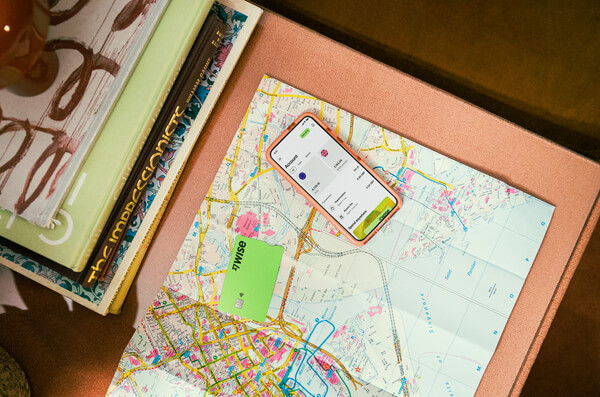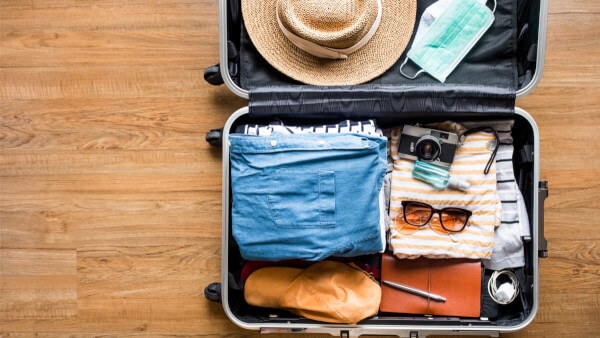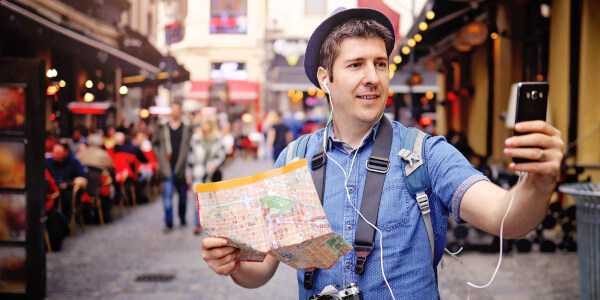UBank vs Wise card - Which is the better travel card to use overseas in Australia?
Looking for a travel card to use overseas? We compared the fees, features, and benefits of two top travel cards: Ubank vs Wise, for Australian travellers.

Traditionally, it’s been tricky to spend money when you’re abroad without racking up big charges; both your home bank and foreign ones can end up charging you if you use an Australian debit or credit card when you’re out of the country. That’s where travel money cards come in.
One popular option for Aussie travellers is from travel money specialist Travelex. This guide is going to break down the Travelex Travel Money Card, including what it is, if it’s safe, and how it all works. You can also learn more about the Wise card, an easy way to stretch your dollars when paying in foreign currencies.
| Table of contents |
|---|
The Travelex Money Card is an extremely well-rated travel card, designed for overseas spending. It supports 10 currencies for holding but can be used to spend online or in-store at locations around the world.
The Travelex Money Card comes with several features to help ensure your funds are secure, making it a relatively safe choice to store your holiday spending money.
Travelex Money Cards are issued by EML Payment Solutions Limited, who hold an Australian Financial Services License, number 404131. This means they have to comply with any regulations that are relevant to the services they offer.
Using the Travelex Money Card is relatively straightforward for Australian travelers.
- Order your Travelex card online or in-store, making sure you have a passport or driver's license on hand.
- Wait up to 7 business days for the card to be delivered to your home or collect it from a Travelex store.
- Activate your card by registering for an account online or via the Travelex app.
- Manage and check your balance online or through the app, topping up the account as needed.
Once funds are loaded, you can use the card anywhere Mastercard prepaid cards are accepted. This includes millions of merchants worldwide, from restaurants, shops, and hotels, to online retailers and tourism operators. The app also lets you track your spending as you go.
🌏 Heading abroad? Compare the best travel cards in our guide for the smartest way to spend overseas.
The Travelex Money Card is designed to be simple and user-friendly, though it’s less comprehensive than multi-currency solutions like Wise. Here are the key features:
- Hold funds in 10 currencies
- Manage online or through the Travelex mobile app
- Compatible with Google Pay and Google Wallet
- Able to earn cash rewards with Mastercard Travel Rewards
- Hold a balance worth up to 50,000 AUD
The 10 currencies the card can hold balances in are the following: EUR, GBP, USD, JPY, NZD, THB, CAD, SGD, HKD, and AUD. This is great for people travelling to places that use those currencies, but less so when going to places with other currencies, such as Indonesia, Vietnam, or China. If you're looking for a card with more currency options, the Wise card allows you to hold and manage currencies.
The Travelex Money Card is marketed as a low-fee option, but it’s important to understand the costs involved. Here are some of the main fees associated with having a Travelex card.
| Action | Fee |
|---|---|
| Purchasing a Travelex card | No fee |
| Top up foreign currency balance | No fee |
| Top up AUD balance | Free online or via the app The greater of 1.1% or $15 when topping up in-store |
| ATM withdrawals | No fee |
| Inactivity fee | 4 AUD per month |
| Currency transfers and conversions | No fee |
As you can see, the charges are very reasonable, but with travel money cards in particular, the exchange rate can be just as important to consider when comparing costs.
Travelex has a few different exchange rates that are used depending on the transaction type.
By comparison, Wise keeps things simple. Wise uses the mid-market exchange rate with no hidden markups, essentially the rate you see on Google. To show how this compares, here’s a look at the exchange rates offered by Wise and Travelex for a few major currencies when converting under 2,000 AUD.
| Travelex Money Card | Wise |
|---|---|
| 1 AUD = 0.644 USD | 1 AUD = 0.6566 USD |
| 1 AUD = 0.4713 GBP | 1 AUD = 0.4886 GBP |
| 1 AUD = 20,371 THB | 1 AUD = 21.25 THB |
| 1 AUD = 93,4319 JPY | 1 AUD = 96.96 JPY |
*As seen on 26 July 2025
As you can see, for these currencies, Wise was consistently better. Since Wise uses the mid-market rate, it indicates that Travelex adds a markup to the exchange rate. As you convert and spend money while you travel, this exchange rate difference can quickly add up, possibly costing you more overall.
Travelex is generally well-regarded by its customers. On Trustpilot, it’s rated 4.5 with over 20,000 reviews. Many first-time users appreciated the straightforward instructions and overall simplicity of using the Travelex Money Card.
Taking a look at the pros and cons:
| Pros | Cons |
|---|---|
|
|
The Travelex Money Card is a simple and convenient way to manage spending in multiple currencies while travelling, especially if you want a straightforward, prepaid option. However, as the rate comparison shows, Travelex’s exchange rates can come with a markup, which means you might pay more without realising it.
If you want more transparency and access to the mid-market rate, as well as virtual cards, Wise may be worth considering.
The Wise card is a simple way to save up to 7x when you're spending internationally. You can spend in 150+ countries at mid-market rate — basically the rate you see on Google. With no foreign transaction fees and low, transparent pricing, Wise usually gives you the best value for your money.

Simply create a Wise account for free, order a card and top-up AUD to get started. Having a physical Wise card allows you to make chip and pin payments, as well as make some free ATM withdrawals each month for when you're abroad. You can get digital cards and add to your Google or Apple Pay wallet for instant use. Spend directly with the Wise account in AUD and let auto-conversion do the trick or convert in advance to your desired currency. You can hold and exchange 40+ currencies in your Wise account and spend the currencies you hold for free.
Wherever your travel takes you, the Wise card makes spending money abroad cheaper and easier.
This general advice does not take into account your objectives, financial circumstances or needs and you should consider if it is appropriate for you. Savings claim based on our rates vs. selected Australian banks and other similar providers in Jan 2025. To learn more please visit https://wise.com/au/compare
Please see Terms of Use and product availability for your region or visit Wise Fees & Pricing for the most up to date pricing and fee information.
Date: 26 July 2025
*Please see terms of use and product availability for your region or visit Wise fees and pricing for the most up to date pricing and fee information.
This publication is provided for general information purposes and does not constitute legal, tax or other professional advice from Wise Payments Limited or its subsidiaries and its affiliates, and it is not intended as a substitute for obtaining advice from a financial advisor or any other professional.
We make no representations, warranties or guarantees, whether expressed or implied, that the content in the publication is accurate, complete or up to date.

Looking for a travel card to use overseas? We compared the fees, features, and benefits of two top travel cards: Ubank vs Wise, for Australian travellers.

The most cost-effective ways to get foreign currency. Compare banks, exchange services, and ATMs with tips to avoid hidden fees and get the best exchange rates.

Planning to use your UBank card to make ATM withdrawals internationally? Read on to understand the true cost of overseas transactions with UBank.

Wondering if Travel Money Oz is the right solution for you? Our guide outlines everything you need to know about their currency exchange and travel money cards.

If you're trying to decide between Travelex and Travel Money Oz for your international money needs, read on for our side-by-side comparison of the features.

Side-by-side Comparison of Westpac Travel Card vs Wise Travel to help Australian users decided which is a better travel card for spending abroad.